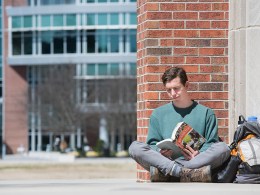UTC Graduate Davey Smith seeks a cure for COVID-19 from UC-San Diego Infectious Disease headquarters.

Dr. Davey Smith isn’t absolutely sure there will be a cure for COVID-19 by the end of the year.
But he’s darn sure going to do his part.
Smith, who earned a biology degree in 1993 from the University of Tennessee at Chattanooga and a medical degree from East Tennessee State University in 1996, today is head of the Division of Infectious Diseases and Global Public Health at the University of California San Diego. He is leading one of more than 30 clinical trials across the country that are pursuing a cure—not a preventive vaccine—for the coronavirus. His trial is being conducted for the National Institutes of Health.
With all the antibody clinical tests taking place, Smith is optimistic that a cure will be found in 2021, but he still has a “good, healthy skepticism as a scientist,” adding “they do look promising. I think we’re going to find one of these that’s going to work and probably more than one. We just need to figure out which one is going to work the best. This is a clinical trial where we’re looking for medications that can keep people from getting hospitalized or dying,” says Smith, a virologist whose expertise is infectious diseases.
“I think we are going as quickly as possible, but we are doing really good science to make sure that we have the right answer and that people are safe.”
To make these new therapies, scientists tracked down people who had severe cases of the virus but recovered. Some of these patients had developed “potent antibodies” that could powerfully clear the virus, Smith explains. Cells that made these antibodies were collected from these recovered patients to produce more. In Smith’s trial, these antibodies will be given to patients with mild coronavirus before it turns into a severe case requiring hospitalization or extra oxygen. “Everyone starts off with a mild or moderate case, but then it progresses. Some people can progress and get hospitalized and we have absolutely nothing, no treatment right now, that can prevent someone from progressing. This trial is to try to find that therapy,” he says.
In the past, this technique has been used to combat Ebola, HIV and respiratory syncytial virus (RSV), which usually shows up in children, notes Smith, who graduated from Red Bank High School near Chattanooga. Phase 1 of the trial was conducted by pharmaceutical companies, which recruited a handful of test subjects and injected them with the antibodies to make sure they were safe. Smith’s team is working on Phase 2, which recruits 220 people nationwide who have mild cases of COVID-19. Half will receive the antibodies and half a placebo, neither group knowing which they’re getting. The scientists conducting the test do not know who received the treatment and who didn’t, so they don’t have any preconceived ideas on who should get better and who shouldn’t.
At this point, Smith and his team are conducting the research at 20 sites nationwide. “We focus on those places that have the worst burden of the disease and those places that know how to do clinical trials,” he says. If the antibody shows promises against the virus, Phase 3 begins with a few thousand people being tested. Smith’s clinical trial is expected to last no less than eight weeks and there’s a chance it may keep going for four or five months, he said. “If it doesn’t show any efficacy in Phase 2, we discard it and move on to the next drug,” Smith says.
Despite the number of clinical trials now taking place, a cure or vaccine by the end of the year is almost impossible, he says. “I think we are going as quickly as possible, but we are doing really good science to make sure that we have the right answer and that people are safe. I just don’t see how we can have a cure that anybody can access by the end of the year, and for sure we won’t have a vaccine that we know works by the end of the year.”







